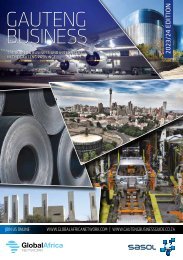Gauteng Business 2017-18 edition
Gauteng Business 2017/18 is the ninth edition of this highly successful annual journal, that has established itself as the premier business and investment guide for the Gauteng province. Special features for 2017/18 include a focus on major new developments in the region’s metros, complemented by detailed overviews of the main economic sectors in South Africa’s most important provincial economy.
Gauteng Business 2017/18 is the ninth edition of this highly successful annual journal, that has established itself as the premier business and investment guide for the Gauteng province. Special features for 2017/18 include a focus on major new developments in the region’s metros, complemented by detailed overviews of the main economic sectors in South Africa’s most important provincial economy.
Create successful ePaper yourself
Turn your PDF publications into a flip-book with our unique Google optimized e-Paper software.
SPECIAL FEATURE<br />
• City of Johannesburg, Central Development<br />
Corridor: provincial capital, finance, services,<br />
ICT and pharmaceutical industries, green and<br />
blue economy.<br />
• City of Ekurhuleni, Eastern Development Corridor:<br />
manufacturing, logistics and transport hub.<br />
• City of Tshwane, Northern Development Corridor:<br />
national administrative capital, automotive sector,<br />
research, development, innovation and knowledge-based<br />
economy, tourism, agri-processing.<br />
• West Rand District, Western Development<br />
Corridor: transitioning mining economy. A new<br />
diverse economy to be created around tourism<br />
(Maropeng World Heritage Site), agriculture and<br />
agri-processing, Lanseria Airport City, renewable<br />
energy industries.<br />
• Sedibeng District, Southern Development<br />
Corridor: steel industry in decline. A new economy<br />
to be based on entertainment and tourism (Vaal<br />
River City), logistics, agri-processing and urban<br />
agriculture.<br />
Opportunities for the private sector were mentioned<br />
in connection with several aspects of the<br />
City Region indaba, not least of which was the necessity<br />
for infrastructure investment. Neither the<br />
central government nor provincial and local government<br />
has sufficient resources to cover what the<br />
provincial government has estimated is needed<br />
in the <strong>Gauteng</strong> province in the 15 years to 2030 –<br />
R1.3-trillion. A 15-year <strong>Gauteng</strong> Infrastructure Master<br />
Plan has been adopted but it is hoped that multiple<br />
sources of funding will see the plan succeed in areas<br />
such as the provision of water, broadband connectivity,<br />
public transport, energy and the reshaping of cities to<br />
accommodate citizens in a better way than was the<br />
case under apartheid.<br />
A World Bank report has shown that a 10% increase<br />
in infrastructure spending results in a 1% growth<br />
in GDP.<br />
Ekurhuleni is putting considerable resources into<br />
infrastructure improvement. With a corridor-based<br />
masterplan, the aim is to promote industrial activity.<br />
The corridors (and focus areas) are:<br />
• Thami Mnyele: transport, BRT, M&T Development<br />
and Plumbago Industrial Park<br />
• OR Tambo Aerotropolis: creative sector, technology,<br />
research and development, logistics<br />
• Thelle Mogoerane: logistics, Carnival Junction, OR<br />
Tambo inland port, Prasa rolling stock manufacturing<br />
facility (Prasa has signed a R51-billion contract<br />
with Gibela consortium to deliver 600 trains).<br />
The city budget for 2016/17 has allocated<br />
R45-million for the revamping of four industrial<br />
parks in Labore and Wadeville. Other projects and<br />
investments include:<br />
• Riverfields mixed use estate<br />
• Green Reef Innovation District<br />
• Badenhorst Estate<br />
• Recapitalisation of the Springs Fresh Produce<br />
Market (R110-million)<br />
• Infrastructure to support agri-processing and distribution<br />
of agricultural products (R80-million)<br />
• R269-million over three years to Township<br />
Economy Strategy.<br />
The nine towns of Ekurhuleni are<br />
being connected by the new Bus<br />
Rapid Transit system (Harambee).<br />
The City of Johannesburg’s<br />
good credit record allowed it<br />
to borrow R3.3-billion for infrastructure<br />
expenditure in 2016. In<br />
2014/15 a surplus of R3.9-billion<br />
was achieved and the city spent<br />
94% of its capital budget, or R10.8-<br />
billion. In 10 years Johannesburg<br />
has raised more than R100-billion<br />
for infrastructure.<br />
Tshwane is planning a series of<br />
transformative infrastructure and<br />
GAUTENG BUSINESS <strong>2017</strong>/<strong>18</strong><br />
14


















